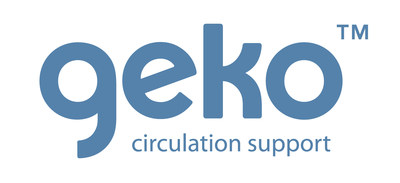FDA Clears GEKO DEVICE for Use in Non-surgical Patients at Risk for Deep Vein Thrombosis Based on Study Demonstrating a Zero Percent DVT Rate in Patients After a Stroke

DARESBURY, England, Oct. 10, 2019 /PRNewswire/ — UK-based medical devices company, Sky Medical Technology Ltd, has received U.S. Food and Drug Administration (FDA) 510(k) clearance for its geko™ device for stimulation of the calf muscles to prevent venous thrombosis in non-surgical patients at risk for venous thromboembolism (VTE). This adds to Sky’s established 510k clearance for immediate post-surgical stimulation of calf muscles to prevent VTE, increasing blood circulation and edema reduction. This is the first muscle pump activator of its kind to be cleared by the FDA for VTE prevention across all patients including non-surgical patients.
VTE is a deadly risk to hospitalized patients, particularly those who are immobile as a result of recovery and fewer than 50% of hospital patients receive appropriate preventive treatment, according to the CDC (Centers for Disease Control). Estimates suggest that 60,000 – 100,000 Americans die each year as a result of the condition, with 10 to 30% of patients dying within one month of diagnosis.

The geko™ device is a non-invasive, easy to use, battery powered, wearable therapy device. The size of a wristwatch and worn at the knee, the daily disposable device gently stimulates the common peroneal nerve activating the calf and foot muscle pumps, resulting in increased blood flow in the deep veins of the calf. The geko™ device operates without external pressure to the leg and allows complete mobility.
A study of the geko™ device to prevent VTE in acute stroke patients reported 0% VTEs in patients wearing geko™ device alone, compared to VTEs in the various control groups prescribed sequential compression devices at 2.4% or pharmacological prophylaxis at 1.1%. The investigators, led by Dr. Indira Natarajan, consultant stroke physician and clinical director for neurosciences at the NHS Royal Stoke University Hospital, also determined that 30% of patients are contraindicated or became intolerant to SCDs (discomfort or dislike to SCDs). It is to this unmet need cohort that the geko™ device was fitted, reporting a zero VTE incidence and good patient tolerance. The data has driven rapid adoption across multiple NHS trusts and international markets, as well as the expanded FDA clearance.
Commenting on the study result, Dr Natarajan said, “The data has shown a need to use the geko™ device when other VTE prophylaxis strategies are contraindicated or impractical and provides an option where previously patients would have had no other intervention available to them. The geko™ device is now in routine use at the Royal Stoke and has marked significant change to our practice.”
Embracing the innovation, Dr Fred Rincon, Professor of Neurology and Neurological Surgery at the Thomas Jefferson University said, “The geko™ device represents an exciting new treatment option for clinicians to manage stroke patients at risk for developing a deep vein thrombosis when clinicians are concerned about bleeding in the early management of the patient.”
Commenting on the FDA clearance, Sky CEO Bernard Ross said, “This latest 510(k) builds on our previous FDA indications to address life threatening blood clots and complications related to swelling after orthopaedic surgery, conditions experienced by more than 1 million US patients with unmet need every year. We are excited to extend our access into the US market. Our muscle pump activation technology, OnPulse™, embedded in the geko™ device, completely redefines the way vascular related conditions are treated. Through our innovative mechanism of neuromuscular electrostimulation, we are the first clinically proven muscle activation technology to prevent and treat a wide range of acute and chronic circulatory conditions both here in the US and internationally. New care pathways are in development in neurology, orthopaedics, renal, and peripheral vascular disease and we plan to submit further FDA applications to expand our claims.”
The company is headquartered in the UK and backed by leading international investors in both healthcare and technology.
About Sky Medical Technology Ltd and Firstkind Ltd
Sky Medical Technology, the parent of Firstkind Ltd, is a UK-based medical devices company. Through its innovative mechanism of non-invasive neuromuscular electrostimulation, Sky has developed a ground-breaking NMES technology platform, OnPulse™, embedded in its industry-leading product, the geko™ device. The company develops a range of products tailored to the needs of different medical application areas, selling both direct and through strategic partnerships or distributors in each major clinical area. Clinical areas of interest include DVT prevention, the treatment and reduction of edema and wound healing. The goal in each pathway is to partner with healthcare professionals to improve clinical outcomes and patient care whilst saving health system resources.
About Royal Stoke University Hospitals of North Midlands NHS Trust
The Royal Stoke University Hospital (RSUH) has a 32-bed combined hyper-acute and acute stroke unit admitting about 1,200 patients with suspected acute stroke per annum. As a primary stroke center it provides thrombolysis and mechanical thrombectomy and receives secondary referrals from other stroke centers not providing these services.
Reference:
1. VTE primary prophylaxis space is specifically projected to grow from US$2.4bn in 2015 to U$3.5bn by 2025, at a CAGR of 4.01%., September 19, 2016 – 13:01. Owen – Editor in chief, Venous Times.
To learn more about geko™ device and using this device in the U.S., please contact Mark Sacaris at mark.sacaris@firstkindmedical.com or at 760.815.6474. Please also visit the geko website at: www.gekodevices.com
View original content to download multimedia:http://www.prnewswire.com/news-releases/fda-clears-geko-device-for-use-in-non-surgical-patients-at-risk-for-deep-vein-thrombosis-based-on-study-demonstrating-a-zero-percent-dvt-rate-in-patients-after-a-stroke-300936380.html
SOURCE Firstkind Ltd
